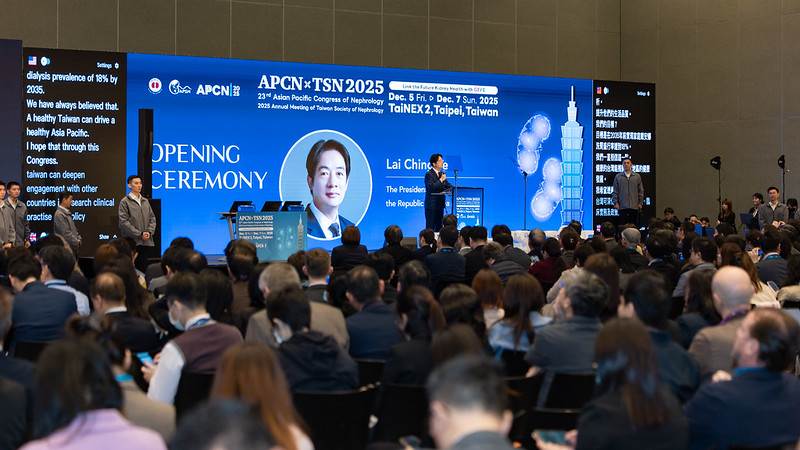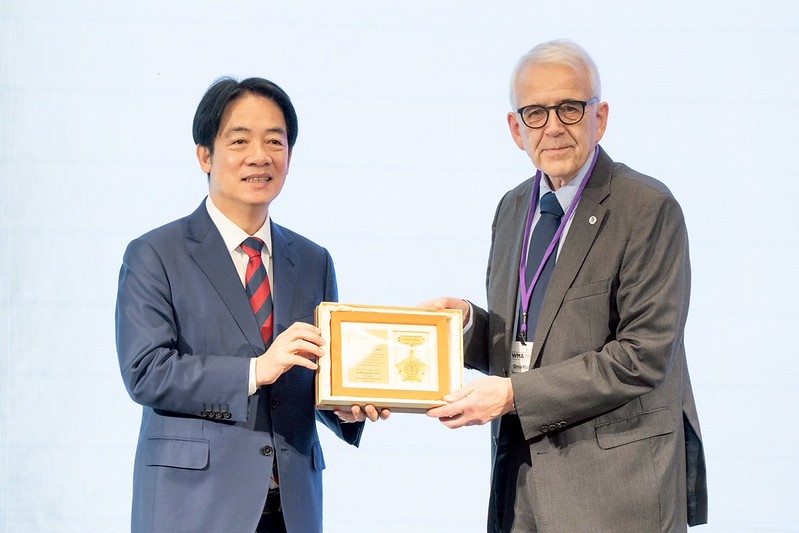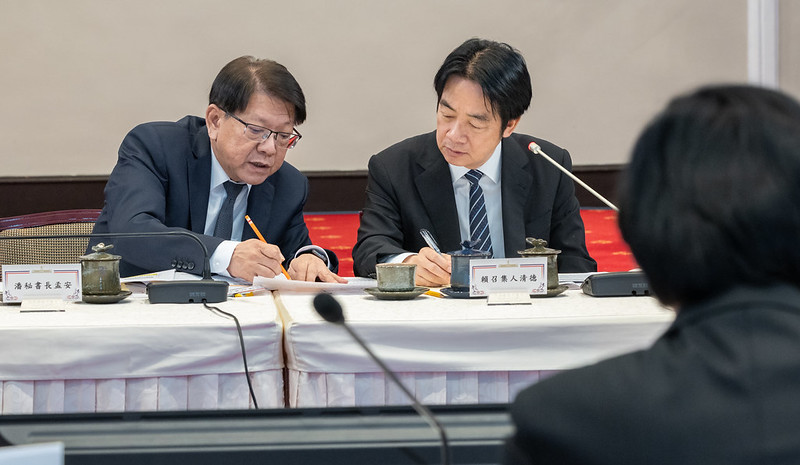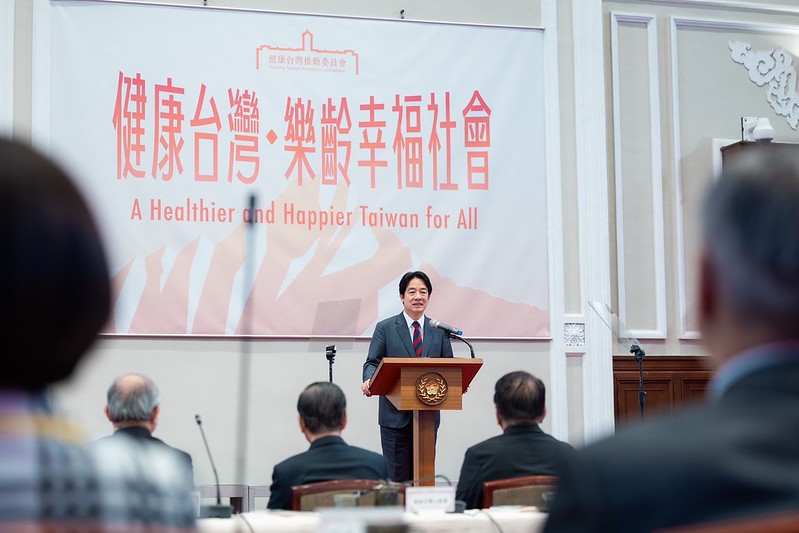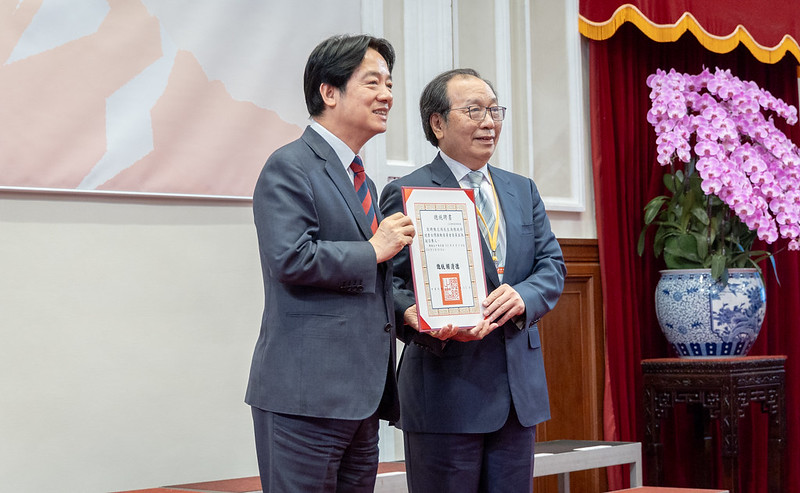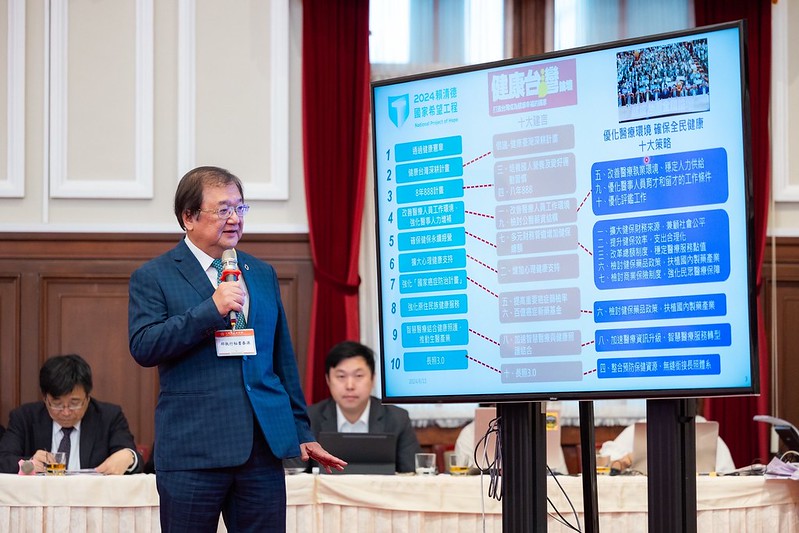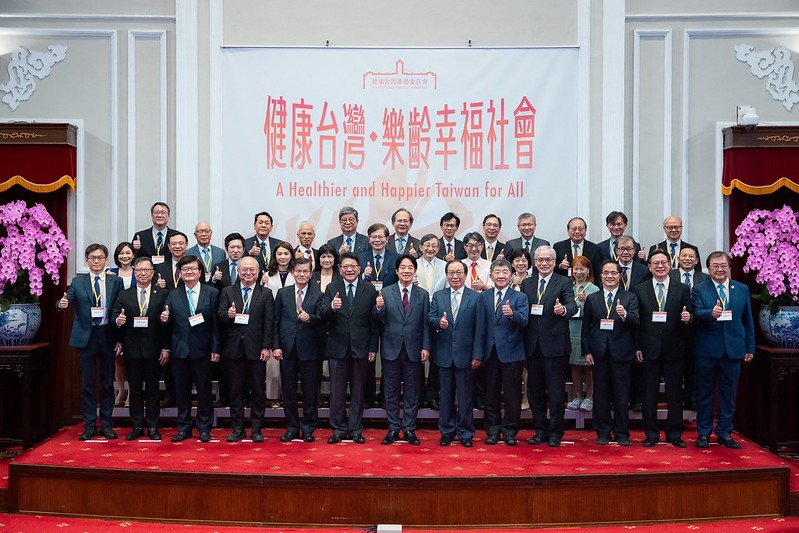News & activities
 News releases
News releases
On the afternoon of August 22, President Lai Ching-te presided over the first meeting of the Healthy Taiwan Promotion Committee. As the committee’s convener, the president presented committee members with their letters of appointment, and explained that the Healthy Taiwan Promotion Committee is not just about promoting a Healthy Taiwan, but also achieving a Balanced Taiwan. The president stated that the committee spans various areas of expertise, and also considers the balance of Taiwan’s northern, central, southern, and eastern regions. The president expressed confidence that by soliciting a wide range of suggestions, engaging in diverse dialogue, and forging a consensus, the committee can help to realize health equality and further elevate the standard of medical care in Taiwan.
President Lai indicated that next year, the Ministry of Health and Welfare’s total budget will be increased, along with expanded investment in medical treatment and care. In addition, he reported that the central government budget has also added a National Health Insurance (NHI) financial assistance program, which will help to enhance the work environments of healthcare professionals. The president stated that we will also launch the Healthy Taiwan Cultivation Plan to help rear talent and develop smart medicine. These budgets and programs, President Lai stated, reflect the government’s determination to create a Healthy Taiwan, and prove that “Healthy Taiwan” is not just a slogan, and has already been turned into concrete action.
A translation of President Lai’s opening statement follows:
At the end of my first month in office, I announced that the Presidential Office will establish three committees in response to three major global issues of nationwide concern: climate change, health promotion, and social resilience. These committees will consolidate forces from different sectors to strategize on national development. At the beginning of this month, we convened the first meeting of the National Climate Change Committee.
Today, we convene the first meeting of the Healthy Taiwan Promotion Committee. I would like to thank the three deputy conveners and all advisors and committee members for making a commitment to the Healthy Taiwan Promotion Committee. I also want to thank our fellow citizens and friends joining us online to follow the committee’s proceedings.
During my campaign, I was constantly thinking about what I could contribute to our people that is different from past presidents if I were fortunate enough to be elected. After a lot of thought, I felt that as a physician, I should utilize my professional background in health care and work together with people from all sectors of society to help create a Healthy Taiwan.
Healthy Taiwan is our goal, and health is both a basic human right and a universal value. Health promotion not only involves the well-being of a nation’s people, but is also of great concern to humankind so that we may survive and thrive.
Taiwan is a responsible member of the international community. Amid the challenges of the pandemic over the past few years, we have shared disease prevention supplies, technology, and experience with countries around the world, and have continued to contribute to the global public health system.
Going forward, Taiwan must actively address critical health-related challenges, including cancer, transnational communicable diseases of unknown origin, antibiotic-resistant superbugs, a low birth rate, and an aging society.
We are confident that, sharing countermeasures and experience with countries around the world, we can keep people healthy and make the nation stronger so that the world embraces Taiwan.
I want to thank former Superintendent of National Cheng Kung University Hospital Chen Jyh-hong (陳志鴻), who is also a mentor of mine, for organizing five regional forums and a national forum for the Healthy Taiwan Promotion Alliance this past March and April. Over 1,200 healthcare professionals from all over the country attended the forums and shared their views. Premier Cho Jung-tai (卓榮泰), Vice Premier Cheng Li-chiun (鄭麗君), and I were also invited to attend the national forum and participate in full.
I also want to thank the experts from various fields for their suggestions throughout this process, which became key reference points for promoting policies after we took office on May 20. The position paper on the table in front of you is a compilation of those valuable insights, which will be the foundation of our future actions.
To implement the Healthy Taiwan initiative, we must also achieve a Balanced Taiwan. Therefore, the Healthy Taiwan Promotion Committee established today not only spans various areas of expertise, but also considers the balance of Taiwan’s northern, central, southern, and eastern regions to achieve nationwide health equality.
I want to thank the nine advisors here with us today: Superintendent Wu Ming-shiang (吳明賢), Superintendent Chen Wei-ming (陳威明), Chairman Cherng Wen-jin (程文俊), President Chiu Kuan-ming (邱冠明), and Chairman Chang Hong-jen (張鴻仁) from northern Taiwan; Superintendent Chen Mu-kuan (陳穆寬) from central Taiwan; Superintendent Lin Sheng-che (林聖哲) and President Yu Ming-lung (余明隆) from southern Taiwan; and Superintendent Lin Shinn-zong (林欣榮) from eastern Taiwan. Your participation will give us a better understanding of viewpoints from around the country.
The objective of Healthy Taiwan is to raise the population’s average life expectancy while simultaneously reducing time spent living with illness or disability, while also caring for physical, mental, and spiritual health. The 20 members of the committee are therefore drawn from a variety of fields of professional expertise.
We have Superintendent Chen Shih-ann (陳適安) in the field of smart medicine, Vice-Superintendent Susan Shur-fen Gau (高淑芬) in pediatric psychiatry, medical and long-term care service integration specialist Superintendent Chan Ding-cheng (詹鼎正), and emerging infectious disease specialist Director Shen Ching-fen (沈靜芬).
We have also invited Professor Tsai Sen-tien (蔡森田) to provide suggestions on optimizing healthcare services and health insurance sustainability, and invited President Chou Ching-ming (周慶明) and President Huang Cheng-kuo (黃振國) to continue promoting The Family Doctors’ Plan 2.0 and report on primary care issues.
We have also recruited President Li Yi-heng (李貽恒), who put forward the 888 Program for prevention and treatment of the “three highs” (high blood pressure, high cholesterol, and high blood sugar) and kidney disease, pediatric health specialist President Ni Yen-hsuan (倪衍玄), women’s health care specialist Secretary-General Huang Jian-pei (黃建霈), and President Hung Te-jen (洪德仁), who is focused on community development. We also have Dean Shan Yan-shen (沈延盛) from the field of cancer prevention and treatment, psychiatric and mental health specialist Professor Su Kuan-pin (蘇冠賓), epidemiology expert and Emeritus Research Fellow Ho Mei-shang (何美鄉), and biomedicine and regenerative medicine specialist Professor Patrick Ching-ho Hsieh (謝清河).
The committee also includes specialist in nutrition and health for all ages President Kuo Su-e (郭素娥), and expert in the promotion of physical activity and health Vice Chairman Chien Wen-jen (簡文仁). I also want to thank Chairman Lin De-wen (林德文) for participating as we work together to enhance the health and well-being of indigenous peoples.
In addition, public sector participants include Minister of National Development Liu Chin-ching (劉鏡清) and Minister of Education Cheng Ying-yao (鄭英耀), as well as Minister of Health and Welfare Chiu Tai-yuan (邱泰源), who is serving as executive secretary, and NHI Administration Director General Shih Chung-liang (石崇良) serving as deputy executive secretary.
Over 80 percent of the committee’s members are from the private sector, and I will take advantage of this opportunity to continue to combine the strengths of all stakeholders throughout society to promote a healthy lifestyle for one and all, and enhance medical care for all ages.
At today’s first meeting of the committee, the Ministry of Health and Welfare will brief us on two topics: the first is the Healthy Taiwan vision plan, illustrating Taiwan’s current challenges and opportunities, as well as an action blueprint. The second issue is reform and optimization for NHI sustainability.
Next year will mark the 30th anniversary of our NHI system. NHI is the pride of Taiwan, because health insurance can free citizens from the vicious cycle of poverty caused by illness, or illness caused by poverty. Since 2020, the NHI system has achieved a public satisfaction rate of over 90 percent.
Next year, Taiwan will also become a “super-aged society,” which means that one of every five people will be a senior citizen 65 or older. Due to new pharmaceuticals of all kinds, the development of new technologies, and citizen expectations for an optimized medical practice environment, many aspects of health insurance operations will face an increasing number of challenges.
The NHI system’s core values are health equality and mutual assistance for all. Better care for everyone, however, depends on sustainable NHI operations.
We closely monitor NHI system point values, but also want to embody the greater values of the system. The government will continue to refine the budget system and management, rationally distribute medical resources and stabilize point values, and continue to optimize NHI finances to enhance the efficiency and quality of services. We also look forward to working with everyone to achieve sustainable NHI development, enhance health equality, and further elevate the standard of medical care in Taiwan.
I also want to report that next year, the Ministry of Health and Welfare’s total budget will reach NT$370.2 billion, an increase of NT$31.8 billion over this year. The total budget is expected to allocate NT$60.7 billion to expand investment in medical treatment and care to create a Healthy Taiwan.
The central government budget has also added an NHI financial assistance program that includes incentives for maintaining specified nurse-patient ratios across all three shifts and rotating night-shift nursing staff, and promoting smart information upgrades at medical facilities to enhance the work environments of healthcare professionals.
We will also launch the Healthy Taiwan Cultivation Plan, investing funds to support medical institutions at all levels nationwide, rear talent, and develop smart medicine.
Regarding the fund for new cancer drugs that many cancer patients care deeply about, in next year’s general budget we will allocate NT$5 billion for health insurance funding. In 2026, that figure is expected to reach NT$10 billion. We will also promote the fifth-stage national plan for cancer prevention and treatment, and beginning next year the budget for cancer screening will be increased by NT$4 billion, reaching NT$6.8 billion, to boost screening rates.
I want everyone to know that these budgets and programs reflect the government’s determination to create a Healthy Taiwan.
Since I took office, the government has created plans and programs to increase nursing staff levels and promote public mental health. We also launched an Acute Hospital Care at Home pilot project to provide integrated long-term and medical care services.
Once again, I would like to thank everyone here today for participating, and thank our fellow citizens for their support. I also want our fellow citizens to know that Healthy Taiwan is not just a slogan, and has already been turned into concrete action. These are all concrete, substantive actions by a government team that has been in office for less than 100 days.
I am confident that with the support and participation of our committee members and advisors, and through soliciting a wide range of suggestions, engaging in diverse dialogue, and forging a consensus, our actions to create a Healthy Taiwan will more closely align with society’s expectations, and we will move more quickly and steadily toward realizing our vision. Thank you.
Following his statement, President Lai presented letters of appointment to the committee members, heard a report from Minister Chiu illustrating the Healthy Taiwan vision plan, and heard a report from Director General Shih on reform and optimization for NHI sustainability. Afterward, President Lai exchanged views with the committee members regarding the content of the two reports and the Rules of Procedure for Meetings of the Office of the President Healthy Taiwan Promotion Committee.
